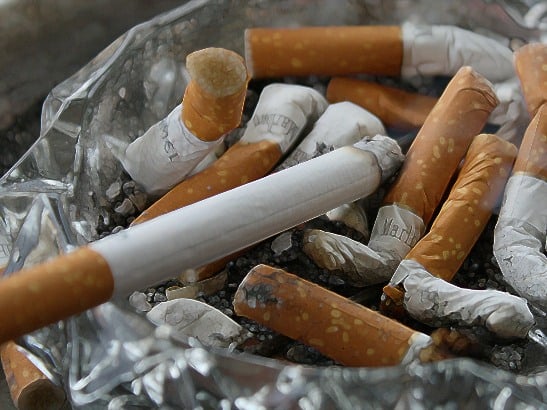
Credit: Pixabay Licence: CC0 creative commons
In matters of healthcare, nothing rivals the dread associated with a cancer diagnosis. Cancer is a leading cause of death worldwide, yet experts estimate that lifestyle changes could prevent four in 10 cases.
Scientists and clinicians must therefore work closely with the media to advise the public on ways to maintain a healthy lifestyle and lower their cancer risk.
Sounds simple, but are we getting this right? Are cancer researchers satisfied with the way that their work is being portrayed, and are the public happy with the quality of the advice that they are receiving?
Here is a selection of foods and lifestyle factors that could be increasing our cancer risk, according to headlines from various media outlets: alcohol, baby food, cigarettes, red meat, cookies, air travel, wearing a bra, smoking, drinking from a plastic bottle, wearing flip flops, exposure to radioactivity, and visiting a nail salon.
Some of these seem legitimate, and others downright mad. With cancer so frequently appearing in our news headlines, what do we pay attention to?
Smoking?
Shock study reveals cigarettes kill 2 in 3 smokers, Daily Mirror, 2015
Both researchers and the public accept smoking as the single largest risk factor for cancer worldwide. According to a study published in the British Medical Journal, which observed the habits of around 34,000 British doctors over 50 years, long-term smoking will cause two in three to die.
Since there are countless examples of studies such as these, and they consistently tell us that smoking increases cancer risk, we are confident in the results. We also understand why smoking causes cancer.
Experts have identified the cancer-causing components of tobacco and cigarette smoke, and have established their roles in gene modulation, DNA damage, and the accumulation of toxins. Rightly, the UK Government and the public have embraced these findings.
Nationwide schemes — including the banning of smoking in the workplace and public areas, and the promotion of e-cigarettes — have encouraged many UK citizens to quit their habit, with a notable decline among the 18-24 age group. A healthy lifestyle has been encouraged and adopted as a result of thorough, robust science. Success!
At the ICR, we believe it's important to take into account differences between cancers and individuals as we discover new cancer treatments – an approach known as personalised medicine.
Bacon?
Yes, bacon really is killing us, The Guardian, 2018
The claim that processed meat causes cancer is a more recent one. A DEVASTATING blow to the UK public, who love nothing more than a bacon butty of a morning. So is bacon really killing us?
In 2015, the International Agency for Research on Cancer (IARC) published its review of the link between processed meat and cancer risk. IARC reports are generally a reliable tool: they arise after a critical assessment of hundreds of independent studies, carried out by world-leading experts in the field.
The verdict: a diet high in processed meat (meaning meat that is not sold fresh, but is somehow preserved) does increase the risk of bowel cancer. However, bacon isn’t really killing us as much as smoking is killing us.
It is estimated that 3 per cent of all cancers are caused by a diet high in processed meat, compared with 19 per cent of all cancers that are caused by smoking. Plus, Cancer Research UK recommends a limit for processed and red meat of 70 g per day, so we’re still entitled to our fair share of bacon and hot dogs. Thank goodness.
Coffee?
Should you be worried about cancer in your coffee? Daily Mail, 2018
Coffee causes cancer now?
Apparently so in California. Starbucks and 90 other coffee merchants have recently been sued there for not warning consumers that their product contains acrylamide, which is supposedly carcinogenic.
However, unless in California the customers of Starbucks are typically rodents, there is no real evidence to suggest that the levels of acrylamide found in coffee (or other foods such as chips and burnt toast for that matter) have an effect on human cancer risk.
The results from a handful of animal-based studies hint that a relationship between dietary acrylamide and human cancer may be established in the future, so the current advice is to be sensible with coffee consumption (and with your toaster settings).
Obesity?
Obesity link to cancer ‘not well known by public’ BBC News, 2016
Recently I watched an interview on the news aimed at raising awareness of the impact that obesity has on cancer risk. Even as a cancer scientist, I’m ashamed to say that I had a fleeting thought: “Everything causes cancer these days.” I chided myself and stuck with the interview, which was very informative and well communicated.
Cancer Research UK has stated that being obese or overweight is the second biggest preventable cause of cancer after smoking, resulting in some of the most common cancer types (breast, bowel), as well as those hardest to treat (pancreatic).
Yet for many, burnt food would spring to mind before obesity if you asked them: “What causes cancer?”
Perhaps the reason is simply that not enough awareness about obesity has been raised. However, I am concerned that our most important messages on cancer prevention are being diluted by the sensational headlines that appear in our news.
So what should we eat and drink then?
Of course, I understand why these headlines are used: they grab the attention of the reader and encourage sales. But is this approach actually mustering interest among the public? Or are we encouraging a lack of respect towards ‘experts’, and boring people into missing vital healthcare advice?
Worryingly, there is often no distinction between articles based on small, ‘one-off’ studies, and those based on multiple studies conducted on a huge scale, with data spanning several decades of observation.
Are scientists too quick to promote their findings? Are journalists misconstruing research to boost sales? Are the public not engaged with science unless the carcinogen is something funky like a flip flop?
It’s difficult to say with whom the fault lies, but it’s clear that scientists and journalists need to be more mindful of the messages that they send.
The best healthcare advice for now? Give up smoking, drink alcohol sensibly, and maintain a healthy weight. Chances are you won’t achieve this by overindulging in bacon, chips and cookies anyway.
Alice King recently completed her PhD with the PET Radiochemistry Team in the Division of Radiotherapy and Imaging.
